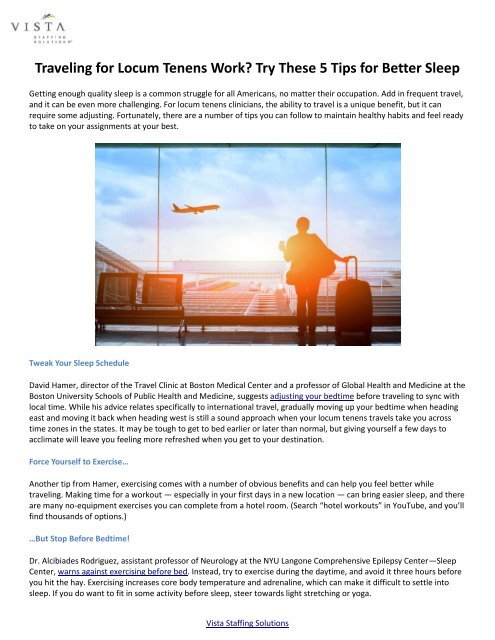Traveling for Locum Tenens Work? Try These 5 Tips for Better Sleep
Getting enough quality sleep is a common struggle for all Americans, no matter their occupation. Add in frequent travel, and it can be even more challenging. For locum tenens clinicians, the ability to travel is a unique benefit, but it can require some adjusting. Visit: https://www.vistastaff.com/
Getting enough quality sleep is a common struggle for all Americans, no matter their occupation. Add in frequent travel, and it can be even more challenging. For locum tenens clinicians, the ability to travel is a unique benefit, but it can require some adjusting. Visit: https://www.vistastaff.com/
You also want an ePaper? Increase the reach of your titles
YUMPU automatically turns print PDFs into web optimized ePapers that Google loves.
<strong>Traveling</strong> <strong>for</strong> <strong>Locum</strong> <strong>Tenens</strong> <strong>Work</strong>? <strong>Try</strong> <strong>These</strong> 5 <strong>Tips</strong> <strong>for</strong> <strong>Better</strong> <strong>Sleep</strong><br />
Getting enough quality sleep is a common struggle <strong>for</strong> all Americans, no matter their occupation. Add in frequent travel,<br />
and it can be even more challenging. For locum tenens clinicians, the ability to travel is a unique benefit, but it can<br />
require some adjusting. Fortunately, there are a number of tips you can follow to maintain healthy habits and feel ready<br />
to take on your assignments at your best.<br />
Tweak Your <strong>Sleep</strong> Schedule<br />
David Hamer, director of the Travel Clinic at Boston Medical Center and a professor of Global Health and Medicine at the<br />
Boston University Schools of Public Health and Medicine, suggests adjusting your bedtime be<strong>for</strong>e traveling to sync with<br />
local time. While his advice relates specifically to international travel, gradually moving up your bedtime when heading<br />
east and moving it back when heading west is still a sound approach when your locum tenens travels take you across<br />
time zones in the states. It may be tough to get to bed earlier or later than normal, but giving yourself a few days to<br />
acclimate will leave you feeling more refreshed when you get to your destination.<br />
Force Yourself to Exercise…<br />
Another tip from Hamer, exercising comes with a number of obvious benefits and can help you feel better while<br />
traveling. Making time <strong>for</strong> a workout — especially in your first days in a new location — can bring easier sleep, and there<br />
are many no-equipment exercises you can complete from a hotel room. (Search “hotel workouts” in YouTube, and you’ll<br />
find thousands of options.)<br />
…But Stop Be<strong>for</strong>e Bedtime!<br />
Dr. Alcibiades Rodriguez, assistant professor of Neurology at the NYU Langone Comprehensive Epilepsy Center—<strong>Sleep</strong><br />
Center, warns against exercising be<strong>for</strong>e bed. Instead, try to exercise during the daytime, and avoid it three hours be<strong>for</strong>e<br />
you hit the hay. Exercising increases core body temperature and adrenaline, which can make it difficult to settle into<br />
sleep. If you do want to fit in some activity be<strong>for</strong>e sleep, steer towards light stretching or yoga.<br />
Vista Staffing Solutions
Consider Your Evening Snacks Carefully<br />
Like exercise, eating can increase your core body temperature and interfere with your ability to hit the hay. Dr.<br />
Rodriguez suggests avoiding heavy meals three to four hours be<strong>for</strong>e bed, though snacks can be OK, so long as they don’t<br />
include caffeine. (Sadly, that means no chocolate.) Dr. Meir Kryger, professor at Yale School of Medicine, adds that spicy<br />
foods can cause sleep arousals, and shifts from deeper to lighter, unstable sleep — so lay off the chili peppers with your<br />
nightly Netflix!<br />
You might have heard that a glass of milk can be helpful, but there’s a lack of supporting research and it can impact<br />
individuals differently. Caffeine-free teas such as chamomile, on the other hand, can have a relaxing effect. Alcohol is a<br />
sedative but should be approached with caution, as it can negatively impact your sleep and, like milk, its effects will<br />
depend on your body.<br />
Melatonin Can Offer Relief<br />
Taken at the right time and dose, melatonin can offer an effective aid to counter jet lag or other shifts in sleep<br />
schedules. While it should not be used <strong>for</strong> insomnia (and even physicians and advanced practitioners should consult<br />
their own doctor be<strong>for</strong>e adding any medication or supplement), experts agree that a low-dose of melatonin can have a<br />
positive impact on circadian rhythm disorders including shift work disorders.<br />
If you’re struggling with sleep in your locum tenens travels, we hope you can find relief from some of these tips. Contact<br />
us if you have any other tips to share. And explore our open positions <strong>for</strong> Physicians and Advanced Practice Providers to<br />
find your next travel destination, or something close to home!<br />
Vista Staffing Solutions


